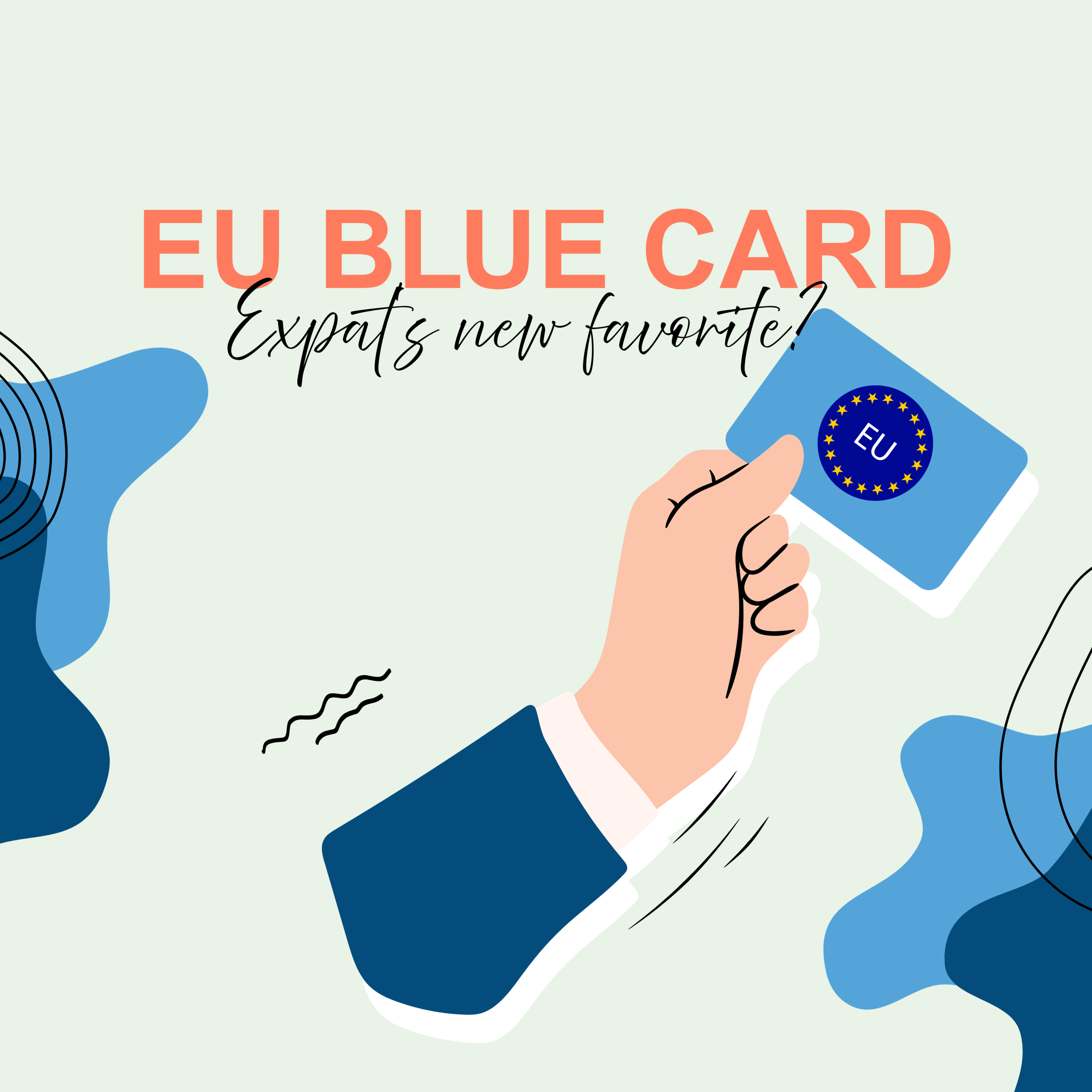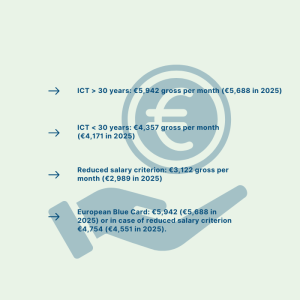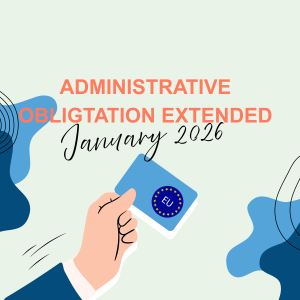The European Blue Card has always been an immigration option with a catchier name than other employment-based permits. When someone would ask about your permit type, saying Blue Card just rolls from the tongue. You see, a color does not need an explanation – it simply is.
Although it has a better name, Dutch employers rarely applied for it in the past years because of the competitive national option: the highly skilled migrant (HSM) permit. In 2022, the Dutch immigration office approved more than 35.000 applications for the HSM permit while the Blue Card was approved only 330 times in the same year. A possible explanation for this could be that the HSM permit is the more favored and easily accessible option amongst employers due to less paperwork, a quicker procedure, and thus an earlier start date. In 2024, however, we noticed that the Blue Card has gained some popularity. While it used to be a back-up solution, we noticed that it is becoming a favored option amongst international employees.In this post, we will explain the differences between the Blue Card and HSM permit and what makes Blue Card the right choice in certain situations.
Comparing the European Blue Card to the HSM permit
To start off, both the Blue Card as the HSM permit make lawful employment in The Netherlands possible for highly skilled and/or highly qualified employees who are non-EU nationals. The situation in which either permit works is when an employer in The Netherlands wants to hire a non-EU employee for a period longer than 90 days and have them be on their Dutch payroll. Below is an overview so you can have a closer look as to the main differences between the two.
| Blue Card | HSM | |
| Salary threshold | The minimum salary threshold to meet is € 5,688 | The minimum salary threshold to meet is € 5,688 For those younger than 30 years old it would be € 4,171. |
| Reduced salary threshold | For those who graduated in the past three years from any foreign study that took at least 3 years which also matches the level of a Dutch higher education study (or certain Dutch Bachelor studies), it is possible that you must only meet the reduced salary criterion of € 4,551. | For those who graduated in the past three years from certain foreign Master studies (or certain Dutch Master or Bachelor studies), it is often possible that you must only meet the reduced salary criterion of € 2,989. |
| Decisive factor for eligibility | Meeting the salary threshold and either having a higher education degree that took three years or a background in highly qualified work for several years is key for a successful application. | Meeting the salary threshold is key for a successful application. |
| Sponsorship | Your employer can be a non-recognized sponsor or recognized sponsor. | Your employer must be a recognized sponsor (unless you hold a Turkish passport). |
| Employment period | The employment contract must include a duration of at least 6 months. | The employment contract must include a duration of more than 90 days. |
| Search period | When you quit or lose your job, and your permit is still valid, you have max. 3 months or less (depending on the validity of your permit) to find a new job as a highly skilled migrant. In case you already had the Blue Card for 2 years, your search period is max. 6 months instead of 3 months. | When you quit or lose your job, and your permit is still valid you have max. 3 months or less (depending on the validity of your permit) to find a new job as a highly skilled migrant. |
| Processing time | The immigration office processes the application within30 days if submitted by a recognized sponsor and in all other cases within 90 days. | The immigration office processes the application within14-28 days (often quicker) if submitted by a recognized sponsor and in all other cases within 90 days. |
| Follow-up permits | In some cases, you could already become eligible for long-term EU residency after only 2 years of stay in The Netherlands instead of 5 years. | You could only become eligible for long-term EU residency after 5 years of stay in The Netherlands. |
Which option is better?
We often receive the question “which permit is better?” Although there are certainly some other permits which we would rarely recommend for any international employee, when it comes to the HSM permit and Blue Card, no permit is per se better than the other. Each permit comes with its own challenges and benefits. To decide which permit is most ideal in individual situations, there are two ways to make the comparison: a requirements-based approach and a rights-based approach.
If we only look at the requirements for either permit, there is a very specific situation in which the Blue Card makes for a better option in comparison to the HSM permit. The lack of recognized sponsorship has always been a serious roadblock when it comes to the HSM permit. So, in situations where the employer is not (yet) a recognized sponsor, the Blue Card is a perfect solution as the employer does not need to have the sponsorship status. We should however make an important sidenote because the Blue Card would only be a suitable alternative if the employee meets the condition of the three-year study or highly qualified work experience. From the perspective of the employer and a requirements-based approach, being a non-recognized sponsor would be one of the few situations where the Blue Card comes out as the better choice, because it would be the only option.
In the situation where an international employee meets the requirements for both residence permits, it could be interesting to compare the two with a rights-based approach. Keeping in mind the rights of the employee, including their future follow-up procedures, the Blue Card is certainly the better choice in comparison to the HSM permit when the employee plans to go for long-term EU residence in the future. The employer is the sponsor of the permit and usually interested in the most cost-efficient and time-efficient choice. So, employers tend to request the HSM permit by default, not knowing that sometimes there could be a more favorable choice for the employee. In practice, we notice that it is therefore usually the international employee who asks for more information about the Blue Card. In the situation that the employee asked about the Blue Card and is eligible for it, but the employer is not on board to fund this permit due to a potentially longer processing time, usually the employee still agrees with the HSM permit if they have no intention to long-term EU residence in the future. With this in mind, we would like to raise some awareness of the benefits of the Blue Card so that you know exactly when you should push your employer for the Blue Card.
Key benefits of the Blue Card
Perhaps it is good to clarify that there is no situation we can think of where the Blue Card would be a less favorable choice, it simply doesn’t exist. In most cases, international employees are interested in the Blue Card when they have previously lived in other EU countries or plan to do so in the future, and they might want to apply for long-term EU residency in The Netherlands or in another EU country in the coming years. To give an idea of this it is good to highlight that a potential outcome of holding a Blue Card in the Netherlands for two years – after previously living in another EU country for a certain period of time (with a Blue Card or certain other type of permit) – could be that you become eligible for long-term EU residence in The Netherlands after two years instead of five years. Another potential outcome of having this permit in The Netherlands could be that it becomes easier to apply for a Blue Card in another EU country and this might also increase your chance to become eligible for long-term EU residence in that other EU country.
Of course, there are several eligibility requirements for long-term EU residence, which we will not discuss today, but having long-term EU residence opens a door to many more benefits for the permit holder, such as for instance:
- no longer requiring an employer to sponsor their permit;
- no longer requiring any form of a work permit for employment; and
- other freedoms such as being outside The Netherlands for a longer period.
These benefits give residing in The Netherlands and or another EU country a more relaxed feeling. With that being said, in the end, it is the employee who therefore benefits most from the Blue Card as they could potentially skip the line in the future when it comes to the long-term EU residence permit. Given that the key benefits of going for the Blue Card can be found in the sphere of the personal rights of the employee, it is not a surprise that the Blue Card became expats’ favorite choice.
The immigration team at PIRGROUP supports with applications for all work-related types of permits, including the Blue Card and HSM permit, but also permanent residence options such as long-term EU residence. Should you have any questions about this post, or would you like us to assess your eligibility for the Blue Card or long-term EU residence, feel free to contact us or call us at the phone number +31 (0) 85 – 620 4900!



